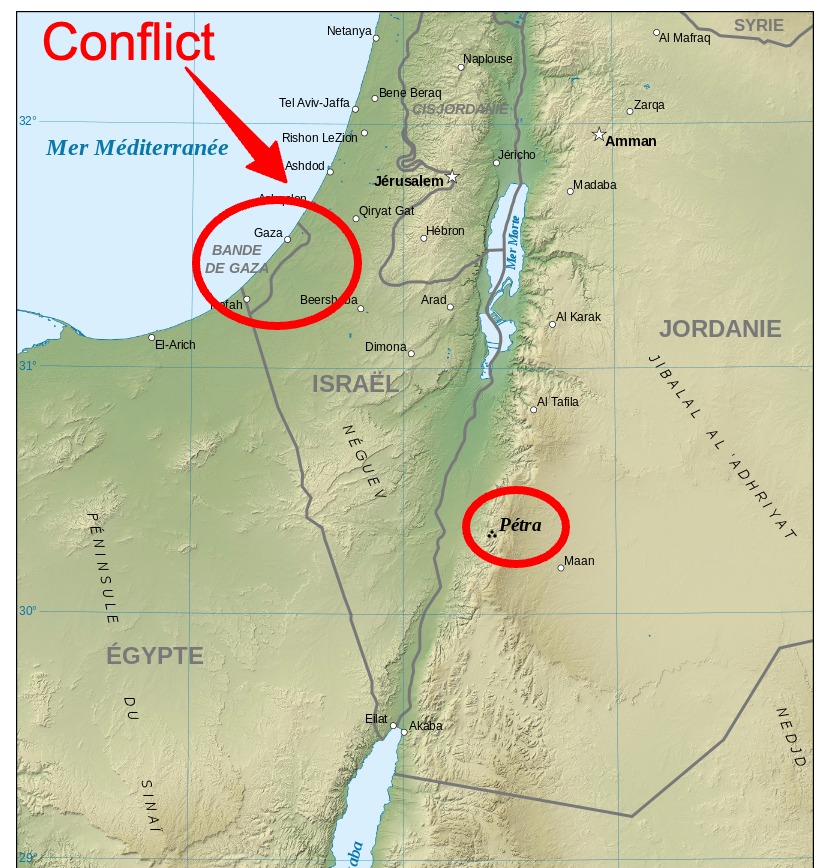Concerns about travel to Jordan and neighboring countries have increased since Hamas attacks in southern Israel became increasingly violent and led to conflict.
Jordan borders both Israel and Syria to the north. Tourists who have already booked a trip there may therefore wonder whether it makes sense to visit the country during the war.
In addition to all important questions and answers, you will also find current travel advice for Jordan on this page.
What are the authorities saying now about a visit to Jordan?
Authorities said in a statement: “In light of the recent developments in Gaza, we would like to emphasize that Jordan remains a safe and welcoming destination for tourists from all over the world.”
“Our commitment to ensuring the safety and well-being of all visitors remains unwavering. We would like to reassure everyone that Jordan’s borders are open to tourists, and we are eager to share our extraordinary experiences with the world.”
The US State Department has not updated its travel advisory since the start of the war in Israel. The US ranks Jordan at level 2: “Be extra careful.” So far it says:
Do not travel to:
- Avoid traveling within a 3.5 km radius of Jordan’s border with Syria and the area east of the town of Ruwayshid, which extends towards the border with Iraq, due to concerns about terrorism and armed conflict.
- Avoid visiting the specific Syrian refugee camps in Jordan due to immigration restrictions imposed by the Jordanian government.
- For your safety, do not visit Zarqa, Rusayfah and the Baqa’a district of Ayn Basha due to the presence of terrorism and high crime rates.
Reconsider traveling to:
- Due to concerns related to terrorism and criminal activity, certain areas within Ma’an City and specific parts of Ma’an Governorate should be avoided.

Except in cases of necessity, the Foreign, Commonwealth & Development Office (FCDO) warns against travel to:
- 3 km (1.8 mi) from Jordan’s Syrian border. To see Border areas
Israel and the Occupied Palestinian Territories (OPTs) have the potential to abruptly close their international borders on land and in the air. The border crossings between Israel and the West Bank and between Jordan and Israel could therefore suddenly be concluded.
The Ministry of Foreign Affairs (FCDO) updated its advice on Tuesday, clarifying its position on travel to Jordan as follows: “The FCDO advises against all but essential travel within a 3 km radius of Jordan’s border with Syria.”
Be extremely careful in Jordan due to the threat of terrorism, civil unrest and demonstrations.
Regional risks: Avoid all travel
Border with Syria:
Due to incidents related to the Syrian crisis, you should avoid traveling to places within 5 km of the Syrian borderwith the exception of the popular tourist destination Umm Qais.
Border with Iraq:
As a result of incidents related to the conflict in this country, you should avoid traveling to locations within five kilometers of the Iraqi border.
Northeast Jordan, east of Ruwaished
Steer clear of any travel east of Ruwaished, in northeastern Jordanbecause there are military activities and there are no emergency facilities in the area.
Safety measures while traveling in Jordan
- Please note that Jordanian laws differ from those in Western countries in several respects, including regulations regarding premarital sex, photography near embassies, military or security facilities, and religious activities. It is essential that you familiarize yourself with these laws and seek professional advice on local legal matters before your trip. Failure to comply with local laws may result in travel restrictions until the issues are resolved.
- Possession and use of illegal drugs should be strictly avoided. Drug-related crimes can lead to severe penalties, including life imprisonment, even for small amounts. Certain serious crimes, such as terrorism, murder, treason and the rape of a minor, may be punishable by death. Other violations, such as causing personal injury or property damage, may result in forced labor.
- Women should be careful as verbal, sexual and physical harassment or assault can occur. It is advisable not to make eye contact or have conversations with unknown men, and walking or traveling alone, especially after dark, should be avoided. When using taxis, always choose the back seat.
- Show respect for the Islamic holy month of Ramadan by not eating, drinking or smoking in public during the day.
- Local customs in Jordan are conservative. Public displays of affection between couples are considered inappropriate, as are unmarried couples living together or sharing accommodation. Same-sex relationships are not socially acceptable and it is important to obtain consent before taking photos of individuals.
- If you have dual nationality, the Jordanian authorities may consider you a Jordanian citizen. Men between the ages of 18 and 40 may be required to register for military service, although completion is not mandatory. Failure to register may result in travel restrictions imposed by authorities.





